Expanding Arms of Occupation: Israel Intensifies Restrictions around Al-Aqsa Mosque
The already volatile situation in occupied Palestine has been exacerbated as a result of further restrictive measures taken by Israel in response to the deadly shoot-out at the Al-Aqsa Mosque compound in occupied East Jerusalem on Friday, 14 July 2017, in which three Palestinians and two Israeli police officers died.
Geneva International Centre for Justice (GICJ) would like to emphasize that – while Palestinians have been confronted with Israeli settler-colonialism and severe human rights violations, including restrictions of their religious freedoms, for many decades – the Occupying Power seems to use the incident to consolidate its control and oppression of the Palestinian people. While constituting part of longstanding Israeli violations, the unilateral steps taken to undermine the last remnants of Palestinian sovereignty represent a further threat to stability and entrench the violent reality in the region.
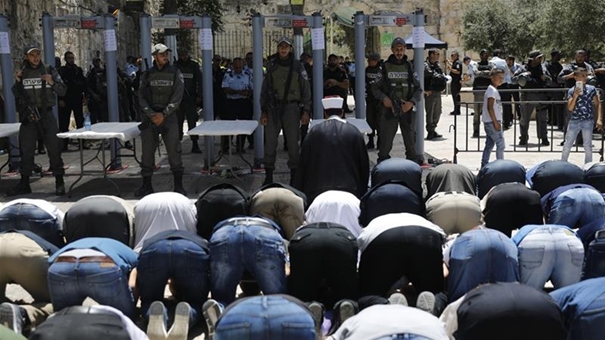
Undermining the Status Quo
Around 7 am local time on Friday, 14 July 2017, three Palestinians, identified as Palestinian citizens of Israel, reportedly shot at Israeli forces near the Lion’s Gate to the Old City and a gun battle erupted at the Al-Haram Al-Sharif compound. Following the attack, Israeli police immediately cleared the Al-Aqsa Mosque compound, closed it to the public, and temporarily detained Jerusalem’s highest Muslim leader Sheikh Mohammad Ahmed Hussein for leading a prayer nearby. While thousands of Palestinians pray at the compound every Friday, Israel closed it down for Friday prayers – the first time since 1969. The doors to the compound remained closed for two days and nights. Palestinian residents of Jerusalem’s Old City, among them Muslims, Christians and atheists, felt that the vibrant heart of the place they call home had been silenced and consequently, the Old City temporarily turned into a ghost town.
The government of Jordan, the custodian of the sacred site, condemned Israel’s unilateral decision to close the mosque, warning in a statement issued the same Friday against steps that could “change the historic status quo in Jerusalem and the mosque”. The sacred site remained closed to Muslim worshipers for more than two days and was then gradually reopened to the public – but with intensified “security” installations, including metal detectors, turnstiles, and closed-circuit television cameras. Israeli Prime Minister Benjamin Netanyahu proclaimed on Saturday that the strengthened measures gave Israel “almost complete control over what goes on” in the compound – which is in violation of the status quo of the site.
The Status Quo at Al-Haram Al-Sharif
The latest Israeli move confirms Palestinians’ long-held fear that the Occupying Power seeks to undermine the status quo at the holy site, following routine raids and incursions by settlers and the military as well as right-wing calls for the demolition of the mosque and the establishment of a Jewish temple at the site.
Palestinian religious authorities and state officials have rejected the unilaterally imposed restrictive measures at the entrances to the mosque as “unprecedented”, “worrisome”, and “dangerous”, which are widely regarded as Israeli attempt to impose complete control and sovereignty over the holy site, to change its status quo, and the status of Jerusalem at large.
| According to the status quo, the Islamic Waqf and Jordan bear responsibility for the management of and access to the Al-Aqsa Mosque compound. Jordan’s custodianship over the holy compound (Al-Haram Al-Sharif/ Temple Mount), which hosts two of the most important religious sites of Islam as well as of Judaism’s Wailing Wall, was already instituted in the 1920s in an agreement between Palestinian leaders and King Abdullah I and was recognized by Israel in 1994. While Muslims are allowed to worship at the site, non-Muslims are allowed to visit and Jews are allowed to pray at the Western Wall. |
The status quo under Israeli occupation is regarded as discriminatory as it de facto signifies that the overwhelming majority of Palestinians (around 95 percent) is prohibited from entering Jerusalem, is banned from accessing Al Aqsa Mosque or the Church of the Holy Sepulchre or any other religious site, and is thus deprived of their right of free worship. The fears that the Israeli government seeks to tear up this already discriminatory status quo are well-founded, given that state officials have long vowed to illegally capture the site and that the Jewish claim to the site has gained ground in mainstream Israeli politics.
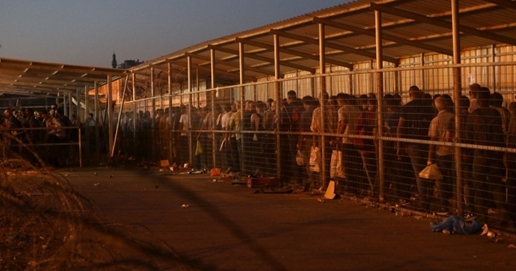
Well-founded fears exist that Israel will again employ Israeli-Palestinian violence and tension as justification to further its control over places central to Palestinians. Palestinians had to bear witness to this strategy pursuant to the 1994 Ibrahimi Mosque Massacre, during which an armed Israeli settler killed 29 Palestinian worshippers in Hebron. Israel had seized the exacerbated tensions to impose its control over the sacred site, erecting security installations and dividing the site into Jewish and Muslim sections. Thus, Palestinians fear that the Israeli government will take advantage of the incident to similarly divide time and space of Al-Aqsa and to impose a new reality. Already now, illegal Israeli settlers can enter the mosque and pray there, as was the case in Hebron in 1994.
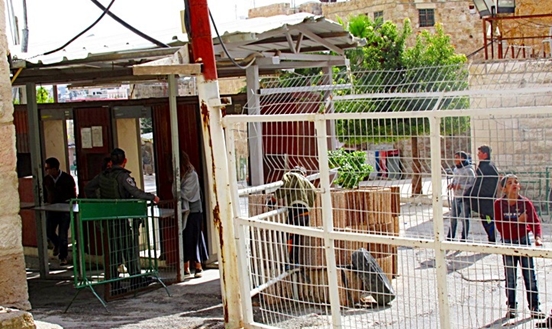
While the developments around Al-Aqsa could represent a further escalation, Palestinians face severe restrictions when trying to access their holy sites in Jerusalem since the beginning of the occupation in 1967. Visiting any holy site entails a long and arduous journey for Palestinians – particularly those living in the occupied territories – that leads through multiple checkpoints and often entails acts of intimidation and harassment by Israeli forces. For Palestinians living in Gaza, reaching Jerusalem’s holy sites is almost impossible. Often, only women and men over 40 and children are granted passage through the checkpoints. Those that reach Jerusalem have to pass through further Israeli military posts before they can finally enter the compound.
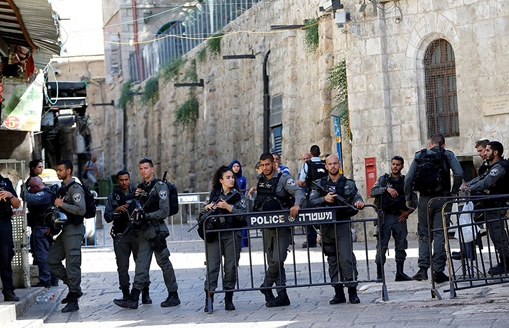
The Status of Jerusalem
Moreover, the measures must be seen as part of Israel’s “policy of Judaization” of occupied East Jerusalem, further depriving Palestinians of their fundamental rights in the city. As discussed in an earlier article by GICJ, in direct contravention to UN resolutions that have reiterated since 1981 that all measures aimed at altering the character and status of the Holy City of Jerusalem are null and void and must be rescinded forthwith:
|
• Israel has continued its illegal settlement activities, particularly the so-called E-1 plan, • To cement control over the City, Israel has perpetuated its “Jerusalem closure policy” by erecting checkpoints, constructing the Separation Wall, and imposing a permit regime. Israel restricts Palestinian access to and residence in East Jerusalem and further isolates the city from Palestine. • The Occupying Power also persistently demolishes Palestinian homes, revokes residency rights and evicts and displaces Palestinians. • Besides, it regularly violates the historic status quo at the holy places of Jerusalem through, inter alia, military incursions, excavations, and acts of incitement. The largely condemned archeological excavations, which threaten the integrity of nearby homes and entail the expulsion and appropriation of Palestinian property, undermine Palestinians’ fundamental rights in their city. • Israel has continued these illegal activities to further the “de-Palestinization” of Jerusalem in an effort to change the demography of Jerusalem in favor of a Jewish majority, with a 70 to 30 percent ratio of Jews to Palestinians, with the larger aim of undermining claims to Jerusalem as the capital of a Palestinian State. |
The situation in Jerusalem merely represents a microcosm of the larger Israeli colonialist and apartheid policies in occupied Palestine. In the most recent development, a bill titled “Basic Law: Jerusalem, the Capital of Israel”, which aims at preventing any future divisions of Jerusalem, has passed its preliminary reading in the Knesset on Wednesday, 19 July 2017. This underlines the lawlessness with which the Israeli State seeks to impose its control.
The Aftermath: Collective Punishment and Violent Confrontations
Closing down Jerusalem
The latest move must be seen in the context of other Israeli violations of Palestinians’ rights and freedoms, which contravene innumerable UN resolutions and the most fundamental provisions of international and human rights law, including the Fourth Geneva Convention. They represent further barriers to religious freedom and are reflective of Israel’s system of institutionalized discrimination against Palestinians.
Not only has Israel shut down and subsequently entrenched the restrictive measures around Al-Aqsa compound, it has also enforced a policy of collective punishment inside the Old City and the rest of East Jerusalem, which Palestinians experience as an escalation of “oppression and violence”. GICJ has received reports revealing that many Palestinian Jerusalemites could not return home until the town was reopened and those that remained in the Old Town witnessed how the place that was usually vibrant with life, with colors, sounds, and odors from the homes, the busy markets, cafés and restaurants turned into a ghost town. Only Israeli military, police and settlers occupied the otherwise deserted alleyways, deepening the sense of fear and oppression.
When the gates to Al-Haram Al-Sharif reopened on Sunday, 16 July 2017, the metal detectors and cameras loomed as additional forms of control. As acquiescence to the electronic inspections would signify tacit acceptance of the occupation’s expansion to the holy site and negation of Palestinian sovereignty, Palestinians continue to challenge the imposed restrictions.
Excessive Force, Raids, and Detention Campaigns
Palestinian Muslim leaders, including the authorities administering the compound, and worshipers have since refused to pass through the electronic gates. In the meantime, dozens of worshippers gathered at the entrance to the Al-Aqsa compound to perform their prayers there. Jerusalemites have since performed prayers outside the Al-Aqsa to protest the heightened “security” procedures. The erupting confrontations with Israeli forces have resulted in detentions of several Palestinians. While performing noon prayers outside the Al-Aqsa compound, Palestinian worshipers have reportedly been assaulted by Israeli forces.
According to Sheikh Abd al-Athim Salahb, chairman of the Islamic Waqf that is responsible for the Al-Aqsa Mosque compound under the status quo, Palestinians collectively refuse to pass through the imposed metal detectors and demand them to be removed immediately, in accordance with their right to freedom of religion and worship.
Over the past days, Palestinians in occupied East Jerusalem have organized sit-ins and have performed prayers in the alleys outside the gates of the holy compound in the Old City. These peaceful means of protest were met with excessive force by the occupation forces.
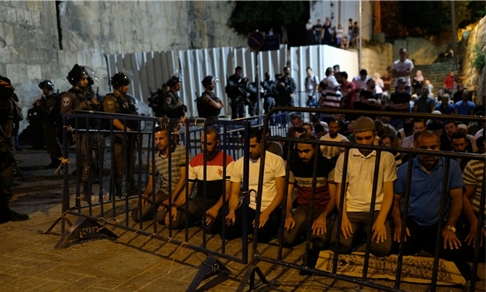
On Monday evening, 17 July 2017, dozens of Palestinian were injured as a result of the violent dispersal of night-time Isha prayers in the alleyways outside Al-Haram Al-Sharif in an expression of opposition to the newly imposed barriers. Israeli forces on horseback assaulted worshippers and injured more than 50 people, according to the Red Crescent: 16 Palestinians were shot with rubber-coated steel bullets, nine sustained wounds from stun grenades, and 25 got bruises after being beaten and kicked.
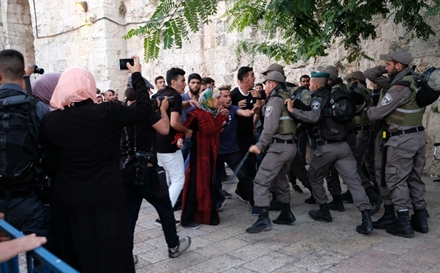
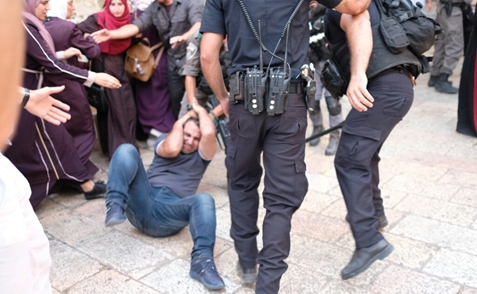
During predawn detention campaigns and raids on the same day, Israeli forces raided the East Jerusalemite town of Abu Dis, Silwan and Issawiya, shooting and injuring one Palestinian in Silwan and detaining two others in Issawiya. Further clashes broke out on Tuesday evening, 18 July 2017, when Israeli forces shot sound bombs and rubber bullets to disperse a crowd of worshippers in the Old City of Jerusalem after evening prayers. According to the Red Cross, at least 50 Palestinians were wounded, including four paramedics and the former Jerusalem mufti.
As a response to Israel’s intensified restrictions, Fatah, the leading party of the Palestinian Authority, had announced Wednesday, 19 July 2017, as a “day of rage” across occupied Palestine. On Wednesday, Palestinians again clashed with Israeli forces in the Old City, as they were harassing, dragging and punching worshippers. Israeli police fired stun grenades to disperse the crowd, with some persons throwing objects in response. Friday prayers were announced to be performed in public squares to protest Israeli procedures in East Jerusalem.
Overnight Monday, 17 July 2017, Israeli forces also carried out a series of military raids across the remaining occupied West Bank, detaining at least 20 Palestinians and imposing a closed military zone on some villages, resulting in clashes. Targets of the raids were Nablus, Tulkarem, Tammum, Jenin, Qalqiliya, villages in the Salfit district, Al-Jalazun refugee camp in the Ramallah area, and Beit Ula, Qila and Beit Ummar in the Hebron area. During the raid in Beit Ummar in Hebron district, Israeli soldiers fired tear gas at homes in response to protesting residents, causing considerable harm to the inhabitants. The village of Azzun was declared closed military zone and military blockades were erected, preventing Palestinians from entering or leaving the village. Homes were raided, Palestinians were subjected to arbitrary security checks, and those protesting were met with stun grenades and tear gas.
Conclusion and Recommendations
Israel today feels emboldened to close the mosque and erect barriers, while Arab states seem reluctant to deplore the decisions. The extreme right-wing government of Israel seems to be testing how far it can go without facing notable reactions and will proceed with its violations if the international community remains silent. Such moves further undermine the stability in Palestine and Israel and in the whole region. By seizing such incidents to enhance its control and undermine the remnants of Palestinian sovereignty, Israel conjures up religiously tinged tensions in a secular conflict rooted in occupation and racial oppression.
Rather than fueling violence in the region, Israel must cease its violations against the status quo of the Holy City and against Palestinians’ freedom of religion. To finally reach a just peace in which the religious, cultural and historic diversity of Jerusalem can flourish and all citizens are guaranteed equal rights and freedoms, Israel must disassemble its occupying system and make way for the establishment of an independent State of Palestine with East Jerusalem as capital. In the light of this, GICJ recommends to the United Nations, to its relevant bodies, and to UN Members States to:
• Finally bring an end to the prolonged occupation of Palestine and fulfill Palestinians’ right to national self-determination, which involves the end of all annexationist and settlement activity and the illegal and destructive blockade on Gaza;
• Immediately cease settlement and annexation policies and practices aimed at altering the character, status, and demography of occupied Palestine, particularly East Jerusalem;
• End its discriminatory planning, development, and land system in all areas under its effective control and rescind all policies and practices resulting in the forced eviction and transfer of Palestinians, including demolitions, confiscations, and the creation of a coercive environment;
• Comply fully with the provisions of the advisory opinion of the International Court of Justice, including by dismantling the Separation Wall;
• Ensure the voluntary return and property restitution of Palestinian refugees and internally displaced persons in safety and dignity and compensation for suffered losses;
• Cease its policies and practices that degrade, dispossess, and discriminate against Palestinians in occupied Palestine, including East Jerusalem, and in Israel;
• Fully guarantee freedom of religion and ensure the protection and preservation of and free access to all sacred places of worship, notably by rescinding the newly imposed “security” measures at the Al-Aqsa compound.
GICJ Activities on the Human Rights situation in Palestine and other occupied Arab territories
GICJ Urgent Appeals on Palestine:
- GICJ - Punishing people for the misdeeds of others clearly violates international law - July 2014
- A match in the powder keg: The occupying force continues to contravene international law - April 2014
- GICJ – Urgent Appeal on the Forcible eviction of Ein Hijleh - February 2014
- UN press release on behalf of Issa Amro - September 2013
- GICJ –Urgent appeal following arbitrary arrest of Sireen Khudiri - June 2013
- GICJ – Follow-up appeal on behalf of HR defender - June 2013
- GICJ - Follow-up appeal on the case of Mr. Issa Amro - April 2013
- GICJ - Urgent Appeal to the Special Rapporteur on the situation of human rights defenders - March 2013
- GICJ – Urgent Appeal to the UN Special Rapporteur on the situation of human rights in Palestinian territories occupied since 1967 - February 2013
GICJ Side-Events and oral statements on Palestine:
Human Rights Council - 30th regular session (14 September - 2 October 2015)
Human Rights Council - 29th regular session (15 June - 3 July 2015)
Human Rights Council - 21st special session on the human rights situation in the Occupied Palestinian Territory, including East Jerusalem (23 July 2014)
Human Rights Council - 26th regular session (10 - 27 June 2014):
Human Rights Council - 25th regular session (3 - 28 March 2014):
Human Rights Council - 24th regular session (9 - 27 September 2013):
- Side-event: Human Rights in Palestine - Palestinian Refugees in Diaspora and their Right of Return, Where to?
- Side-event: Human Rights in Middle East - Give Peace a chance
- Democracy and the Right to self-determination
- GICJ statements on Palestine
Human Rights Council - 23rd regular session (27 May - 14 June 2013):




